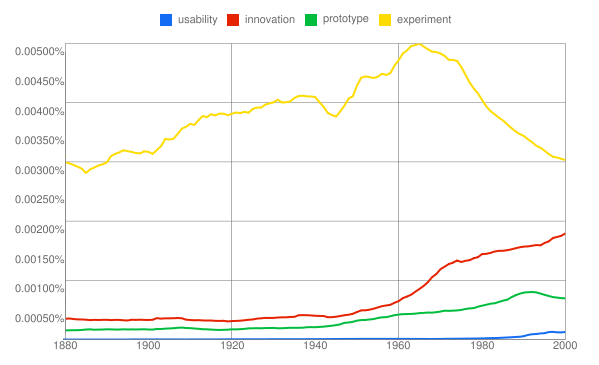Innovation vs. Usability: In numbers
Playing around with the new Google Labs Ngram viewer (which searches for usage of words in the entire google books archive), I compared the use of four words, usability, innovation, prototype, and experiment, over the last 100 years. Chart shown below:

I complain often about abuse of the word innovation. I also advocate the use of the word experiment. Interesting to see the decline of the later at the same time as the rise of the former. I’m clearly on the losing side.
You can run this query, or build your own. It’s fun. Not sure what conclusions can be drawn from such a wide pool of data, but interesting none the less.

I’ve seen several interesting and fun graphs since the Ngram Viewer went live – clearly an example of a viral tool.
While interesting, I’m not sure how much to make of content drawn exclusively from books (vs. other media), especially with respect to generalizations. I anticipate a spike in confirmation bias … though most examples of confirmation bias are not explicitly acknowledged as such by the authors, so I don’t expect a new spike in the term “confirmation bias” … though NGram Viewer shows that confirmation bias does appear to be on the rise … confirming my bias. Wow, this is fun! :)
Oops, I meant to say “disconfirming my bias”.
Also, one positive thing about focusing on books is that it is harder to write a book that is spam than it is to, say, “Create a Twitter account and follow me”, “Like my YouTube video”, “Download this app”, “Write a positive review on Yelp” (examples of social media spam from a recent study of spam on Mechanical Turk).
Joe:
That confirmation bias shows a disturbing little blip around 1900. Wonder what was going on there?
Do you think it’s because experiment involves more work? Experimenting also implies failure over and over before success, if success is even the goal. Sometimes experiment is just about learning more.
Innovation is simple. Come up with new idea. It’s awesome and everyone implements it.
Jeb: Language is weird. Which words are popular or not has much to do with prevailing cultures and attitudes of the day. In American business culture the word experiment implies you’re not certain what you’re doing, which signifies, at the moment, incompetence.
Wiser people realize that innovation demands experimentation – and people who use that word probably have a better clue on how to do it well than those who promise brilliant and revolutionary ideas every week.
The reason the words “Innovation” and “Experiment” are showing opposing trend lines, is the same as opposing trend lines between the usage of the words “hypothesis” and “Theory”. Our culture rewards those who get to end first. Rarely, does anyone remember that until an idea is proven, it is just a hypothesis. Same as this comment.
However, our love of theories probably explains why people focus so much time on the word “innovation”. There is no word, like “hypothesis”, that describes what happens before the innovation.
Interestingly, the new format for NIH (medical research) funding applications includes an ‘innovation’ section. I expect the trend to continue.